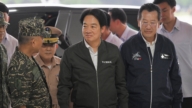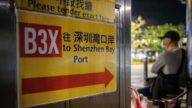【新唐人2012年9月25日讯】日本媒体证实,原定于27号在北京人民大会堂举行的“中日邦交正常化40周年”庆典,被中方取消,显示中日关系全面恶化。不过,和日本“国有化”钓鱼岛同时发生的中菲南中国海主权纠纷,却没有得到同样的关注。评论指出,十八大前,中共以“维稳”为大,并不会有太多实质性的动作。
《新华社》英文版23号说,日本政府“国有化”钓鱼岛的行动破坏了应有气氛,“中日邦交正常化40周年”活动“调整到适当时候举行”。这是中日邦交正常化以来,首次取消10年一度的庆典活动,显示中日关系恶化程度,两国邦交史上罕见。
时事评论员夏小强指出,虽然“反日”和“民族主义”,向来是中共官方手里的一张牌,这次之所以不同以往,是掺杂了中共高层左右双方的博弈在内。
夏小强表示,“此次反日闹剧和以往不一样,在十八大后面临清算的江派残余势力周永康等,借钓鱼岛事件趁机起事,制造混乱,以达到习近平不能顺理接班、延长周永康等权力的目地,颇有拚死一搏的味道,前几天在全国各地上百城市反日游行打、砸、抢,就是这种表现。”
日本《每日新闻》23日报导了庆典活动被取消的消息,并说,北京当局在试图一点一点收紧大规模的反日活动的同时,为了避免对日本的批判显得太软弱,必须要维持一种强硬的姿态。
上周六和周日,各大城市已没有再出现大规模反日示威。香港《苹果日报》说,这显示当局不只没有再组织民众上街,连自愿上街的爱国者也受到管制。如果当局只是如此单方面强硬压制反日示威,不难想像,民间“反政府的声浪”不会低过反日声浪。
夏小强说“取消中日邦交40年纪念活动,是习近平利用外交手段向日本以示强硬,安抚民心,消除国内的压力,但是在十八大前完成领导人交接班是中共高层的首要任务,所谓‘维稳’是重点,我觉得对日本的这些强硬外交手段可能只是一种姿态,并不会有太多实质性的动作,还会暂时保持现状。”
值得注意的是,虽然习近平在钓鱼岛问题上表现出强硬态度,但是习近平在“南海问题”上的表态却有鲜明反差。他在9月21日出席“中国东盟自由贸易区论坛”开幕式上,强调中菲双边关系发展,并没有提及中菲南海争端。
而事实上,就在日本政府把钓鱼岛“国有化”的隔一天,9月12日,菲律宾总统阿基诺正式宣布:把菲律宾西海岸外的南中国海海域命名为“西菲律宾海”。菲律宾总统府当天发布的政令表示,“西菲律宾海”的标记,将出现在菲律宾政府发行的地图上。
越炒越热的“钓鱼岛”和受到冷处理的“南中国海”形成鲜明对比,旅居美国的中国社会问题研究人士张健指出,这体现出中共在领土问题上的态度。
中国社会问题研究人士张健认为“共产党它就是这样,它想卖的时候,海参崴已经卖掉了,他永远的是不让中国人知道,通过各种方式来控制。那么钓鱼岛不能拿回来,钓鱼岛是中国一个…可以说中共应该感谢的,因为钓鱼岛是使它化解国内危机最强有力的地方。”
张建指出,中共已开始收束民众保卫国土的主张,在国内也将无法持续表达。
张健说“作为一个中国人你知道你的领土、神圣不可侵犯的领土有多少被人家侵犯了,而你不能作声的?保卫钓鱼岛的时候,首先想一想你的人权、你的话语权、你生存的权力有没有得到足够的保障?如果你能得到这些足够保障的时候,那么中国就基本上是跟其他的民主国家应该是站在一个起跑线上。”
海外媒体指出,中方目前想达到的目标,是对钓鱼岛实行“中日共管”。不过,《大纪元时报》报导,台湾的亚洲问题专家郑继文认为,建立“中日共管”,不大可能是中共已经确定的决策,因为中共目前正在全力筹备18大,在新的领导班子确定之前,中共不大可能对这类重大问题作出决定。
采访/常春 编辑/尚燕 后制/王明宇
Diaoyu Island Issue Fires Up, As South China Sea Stays Cold
Japanese media confirmed that, China had canceled the 40th
anniversary celebrations of the stabilizing diplomatic relations
between Japan and China, originally scheduled to be held
in Beijing’s ‘Great Hall of the People’ on September 27.
It shows the overall deterioration of Sino-Japanese relations.
Sovereignty disputes between China and the Philippines over
the South China Sea arose alongside Japan’s
“nationalization" of the Diaoyu (Senkaku) Island,
yet did not receive as much attention.
Comments say, the Chinese Communist Party (CCP) place
importance on “maintaining stability” before their 18th National Congress, and is not taking much practical action.
On Sep.23, CCP mouthpiece media Xinhua’s
English version said,
the Japanese government’s nationalization of the
Diaoyu (Senkaku) Islands destructed the atmosphere in China.
Xinhua continued, “The 40th anniversary of the normalization
of diplomatic relations" will be held “at the appropriate time."
It’s the first time the celebration has been canceled;
it’s been taking place every 10 years since the normalization
of Sino-Japanese diplomatic relations—showing that the
degree of deterioration has reached levels rarely seen in history.
Political commentator Xia Xiaojiang points out that, although
the CCP has always pushed “anti-Japanese” and “nationalism” propaganda,
this time it’s different, as it contains the struggle
between the CCP’s left and right political wings.
[Xia Xiaoqiang, Political Commentator]:
“This anti-Japanese farce is different from ever before,
since after the 18th CCP National Congress, the surviving force
of the Jiang Zemin faction, Zhou Yongkang, will be liquidated.
The CCP hope to use the Diaoyu Islands incident to stir up
trouble and create chaos, in order to smoothly hold back Xi Jinping and extend Zhou Yongkang’s power.
This is the reason why anti-Japanese demonstrations emerged
in hundreds of cities across China a few days ago.”
On Sep.23, Japan’s Daily News reported on the canceled
celebration, saying Beijing authorities have tried to tighten up a little on the large-scale anti-Japanese uproar.
At the same time, the CCP maintained a tough stance towards
Japan, to avoid being criticized as being too weak.
On Saturday and Sunday (Sep. 22, 23), China’s major cities
saw no further large-scale anti-Japanese demonstrations.
Hong Kong’s Apple Daily says the authorities didn’t organize
people to demonstrate in the streets any more,
and even the Patriots’ voluntary protests were under control.
If the CCP had been tough in suppressing the anti-Japanese
demonstrations unilaterally, it’s not hard to imagine that
the wave of “anti-CCP" sentiment that would immerge
would reach a level no lower than the anti-Japanese uproar.
[Xia Xiaoqiang, Political Commentator]:
“Canceling the Sino-Japanese diplomatic relation’s 40-year
commemoration is Xi Jinping’s diplomatic means of
eliminating domestic pressure and showing a tough attitude to Japan, to pacify the Chinese people.
Yet, the CCP’s primary task is the leadership cross succession
in their 18th National Congress and the CCP’s so-called “maintaining stability" is a key issue.
I think these tough diplomatic means towards Japan may be
just a gesture; it will not have much substantive action,
and will maintain the status quo within China temporarily."
Xi Jinping shows a tough stance on the Diaoyu Islands issue,
contrasting with his stance on the South China Sea.
On September 21, he attended the opening ceremony of
the Forum on China-ASEAN Free Trade Area,
and stressed the development of Sino-Philippine bilateral
relations, while not mentioning their South China Sea conflict.
3 days after the Japanese government announced their
nationalization of the Diaoyu Islands, on September 12,
Philippine President Aquino officially announced to rename
their west coast of South China Sea as “West Philippine Sea”.
On the same day, the Philippine presidential decree released
that the Philippine government will be issuing maps marking the “West Philippine Sea" along the Philippine west coast.
Heated speculation surrounds the Diaoyu Islands events, in
strong contrast to the coldness over the South China Sea issue.
Researcher of social problems, Zhang Jian, who has lived in
the United States, points out that it reflects the attitude of the Communist China on the territorial issue.
[Zhang Jian, Social Problems Researcher]:
“It’s the communist party, when they want to sell, Vladivostok is sold;
the CCP will never let the Chinese people know,
and they maintain control through a variety of ways.
It cannot get the Diaoyu Islands back; the Islands are…
it can be said that the CCP should be grateful, because
the Diaoyu Islands are the most powerful tool for them to use to resolve their domestic crisis."
Zhang says, the CCP’s started to close up the Chinese people
to ‘defend’ the homeland; even advocates will not be able to continue voicing their expression within their country.
[Zhang Jian]: “As a Chinese, you should know
how many people are in your territory,
how many sanctity territories were violated,
and how you cannot make a sound.
When defending the Diaoyu Islands, you should think about,
first of all, have your human rights, your rights of expression,
and your rights to survive been protected enough?
If China could give enough of these protections, essentially
China should then be standing at a starting line alongside other democratic countries."
Overseas media point out that, China currently wants to
achieve Sino-Japanese condominium of the Diaoyu Island.
However, as the Epoch Times reports, Asia problem expert
Zheng Jiwen in Taiwan thinks,
to establish a “Sino-Japanese condominium” is unlikely
to be an identified decision made by the Chinese Communists.
The CCP was preparing fully for the 18th National Congress;
Zheng thinks, before the new leaderships are determined,
the CCP is unlikely to make decisions on such major issues.
























